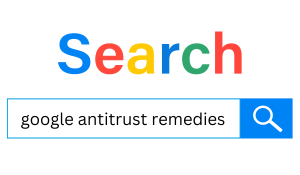I was not alone in noting the significance of the D.C. district court's decision earlier this month to hold Google liable for monopolization of the general search market and the search text advertising market in United States, et al. v. Google LLC, No. 1:20-CV-3010-APM, D. D.C. I previously covered how the antitrust enforcement agencies successfully argued that Google's exclusive deals with smartphone manufacturers, browser developers, and wireless carriers amounted to anticompetitive conduct with the effect of maintaining its search monopolies. In the following, I give my perspective on potential remedies in the case.
 It was decided prior to the trial against Google Search to split the proceedings into two phases, a liability phase and a remedies phase. The liability phase was completed upon the filing of Judge Mehta's Memorandum Opinion which contains the court's findings of fact and conclusions of law. This decision eventually will be appealed by Google and could be overturned by the D.C. Circuit Court of Appeals, although the appeal is likely to have to wait for the conclusion of the remedy phase.
It was decided prior to the trial against Google Search to split the proceedings into two phases, a liability phase and a remedies phase. The liability phase was completed upon the filing of Judge Mehta's Memorandum Opinion which contains the court's findings of fact and conclusions of law. This decision eventually will be appealed by Google and could be overturned by the D.C. Circuit Court of Appeals, although the appeal is likely to have to wait for the conclusion of the remedy phase.
A hearing before the trial judge is set for September 6 to discuss how the remedies phase will move forward. That phase will involve consideration by the court of proposals by both sides regarding the steps to be taken to restore competition in the markets in which Google has been found to be a monopolist, the market for General Search Services and the market for General Search Text Advertising. There are two broad categories of remedies, so-called behavioral remedies and structural remedies.
Potential Behavioral and Structural Remedies
Behavioral remedies are rules that the company must follow for a period of time. For example, the court could prohibit Google from entering into contracts with third-parties to be the exclusive default search engine on a device or in a browser. Another behavioral remedy is requiring a "choice screen," where users choose the search engine they want as their default in a given environment. It is not clear that either of these (or any) behavioral remedy will accomplish the purpose of restoring competition to the two affected markets. Google Search may have such a large lead that prohibiting default agreements may have no effect at all on competition in the market and the EU has been largely unsuccessful in promoting competition by mandating choice screens. And the court only has jurisdiction to order Google to follow certain rules, it has not authority to require Apple or any other third-party to do anything. It is highly likely that Google will prefer a behavioral remedy because such rules usually can be defeated by a work-around strategy.
A structural remedy involves separating the company into smaller parts. Some commentators have suggested separating Search from the Android and Chrome operating systems, but, again, there is no clear mechanism to show how this will restore competition in the relevant markets. More promising, although more extreme, is a structural remedy that separates the indexing function of the search engine from Google Search, and allows the former to retain the collected click and query data and to serve as a type of utility to other search engines. This type of remedy is much more typical of the Europeans than in the U.S., where forcing private companies to serve as public utilities is highly disfavored.
Because of the complexity of the problem, there are likely to be several more rounds of litigation leading up to a final remedies hearing. It is likely that on September 6, the parties will outline the additional information and expert analysis that are needed before their remedy proposals can be submitted. This process could take a long time in the fast-moving tech industry, where, in the meantime, AI-enhanced search could alter the existing competitive landscape.